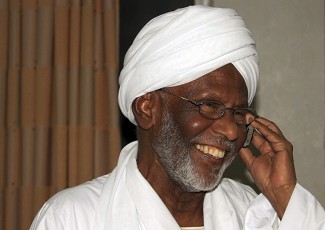Turabi sees imminent Arab Spring in Sudan
January 5, 2012 (KHARTOUM) – The Sudanese opposition leader, Hassan Al-Turabi, has launched a new tirade against the government, predicting that its failures will soon lead to a popular uprising.

Al-Turabi was incarcerated for three months last year after he made a similar prediction that the “Arab Spring” contagion would eventually spread to Sudan if the government continued to resist calls for reforms.
Referring to that occurrence, the veteran Islamist said he now expects himself to be “dragged to jail at any moment” but he added that he is prepared for this and determined to “wage Jihad” against the regime regardless of the cost.
Al-Turabi went on to launch a fierce attack on the head of Sudan’s intelligence services, Mohamed Atta, accusing him of “stealing” documents prepared by his party on the current political situation.
Atta claimed on Tuesday that security authorities had obtained documents written by Al-Turabi himself on possible scenarios of toppling the regime.
According to the intelligence chief, these documents were caught in the possession of Al-Turabi’s senior aide, Ibrahim al-Sanousi, who was arrested in December upon his return from a visit to the Republic of South Sudan and Uganda.
But Al-Turabi disputed Atta’s account, stressing that those documents are not confidential and were widely circulated among his party members.
He further said that Al-Sanousi was not carrying those documents and that security agents had probably “stolen” them.
Al-Turabi accused the intelligence chief of distorting the truth by saying that the documents revealed that he was contemplating a military coup.
According to Al-Turabi, Atta had omitted to mention that the documents stated that past experiences of all political parties made them despise military coups.
The Islamist leader continued his attack on Atta, saying that he like his boss, in reference to president Al-Bashir, thinks that power can only be gained through military coups.
Al-Turabi was the mastermind of the military coup that brought president Al-Bashir to power in 1989, but an irony of fate saw him being ousted ten years later after he fell out with Al-Bashir.
Al-Turabi has since become the government’s most outspoken critic and has been detained on several occasions.
The influential Islamist detailed a long list of government failures, saying that its tyranny has separated South Sudan and created a state of mistrust among local communities in the country’s peripheries.
“They don’t care about the south, or [the western region of] Darfur or Nuba [in South Kordofan State]. And tomorrow they will not care about the Beja [in eastern Sudan].”
He also denounced the government for assassinating Darfur rebel leader Khalil Ibrahim, warning that such precedent is foreign to Sudanese people.
Al-Turabi turned to direct his criticism against president Al-Bashir, saying that his declarations about transforming Sudan into a purely Islamic state were empty rhetoric. He added that a true Islamic constitution must be translated into actions in dealing with minority groups.
He further accused the government of seeking to isolate his party from other opposition groups because it fears their influence. The opposition figure concluded that the contagion of Arab revolts will happen “abruptly and very soon”.
(ST)
